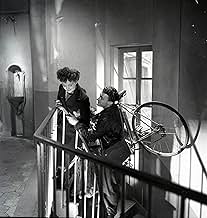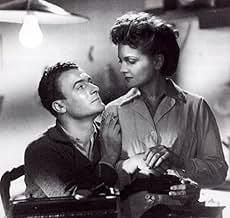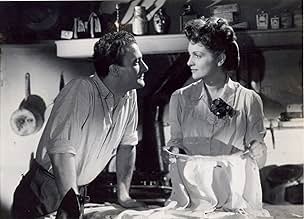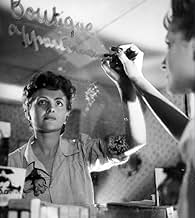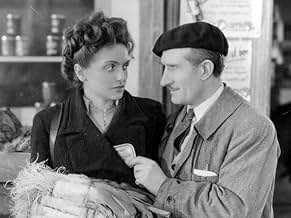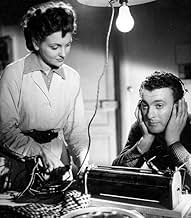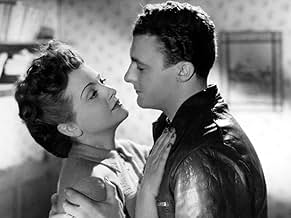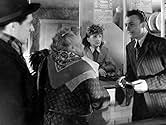Antoine et Antoinette
- 1947
- 1h 24min
NOTE IMDb
7,4/10
1,2 k
MA NOTE
Antoine et Antoinette rêvent d'une vie meilleure. Repoussant l'attention indésirable des hommes, en particulier l'épicier Monsieur Roland, Antoinette achète un billet de loterie gagnant, qu'... Tout lireAntoine et Antoinette rêvent d'une vie meilleure. Repoussant l'attention indésirable des hommes, en particulier l'épicier Monsieur Roland, Antoinette achète un billet de loterie gagnant, qu'Antoine accidentellement perd.Antoine et Antoinette rêvent d'une vie meilleure. Repoussant l'attention indésirable des hommes, en particulier l'épicier Monsieur Roland, Antoinette achète un billet de loterie gagnant, qu'Antoine accidentellement perd.
- Réalisation
- Scénario
- Casting principal
- Récompenses
- 1 victoire et 1 nomination au total
Claire Mafféi
- Antoinette Moulin
- (as Claire Maffei)
Nicolas Amato
- Un client
- (non crédité)
Brigitte Auber
- Une invitée au mariage
- (non crédité)
Odette Barencey
- La blanchisseuse
- (non crédité)
Paul Barge
- Le boucher
- (non crédité)
Léon Bary
- Un voyageur
- (non crédité)
Avis à la une
Jacques Becker was a successful chronicler of the post World War II generation who made remarkable films which dealt ironically with the problems of its protagonists.His creation,Antoine et Antoinette has remained a minor Proletarian classic.It has rightly been hailed by some critics as a light romantic comedy.The film boasts of a typically French psychological analysis.Becker has cast a fascinating look at the working class life by attempting social description in nuances.Antoine et Antoinette succeeded by incorporating all the essential themes with which a typical working class family could easily indentify itself.
This is a simple story about ordinary people.
The interesting part is the view it offers on the early post-WWII life in the Franch capital.
hats off to Becker's adroit story-telling felicity and his profound compassion towards the have-nots
The protagonists of Jacques Becker's Paris working-glass comedy is a young couple, the titular Antoine (Pigaut) and Antoinette (Mafféi), he works in a printing press and she in a department store, they don't have much savings and live in a frowzy apartment, but an exuberant sense of community permeates through their ordinary lives, and it is books marred by printing errors, which are given to Antoine gratis by his honcho and then circulated by Antoinette within her circle of friends in the working place and neighbors, that oils the wheels of this affecting community, and Becker's camera swirls and roves with great kinetic ease and facility in delineating this charming facet of quotidian breeziness.
A discordant note is added to the fold from Mr. Roland (a cross-eyed, importuning Roquevert), the proprietor of a local grocery store, who has a design on the comely Antoinette, and cunningly encroaches in front of their doorsteps on the pretense of repairing Antoine's broken bicycle, and his salacious intrusion will in time culminate near the coda with fisticuffs, which is unexpectedly utilized as a coup-de-thêàtre to swiftly shunt the story to an auspicious denouement.
A windfall of nearly 1 million francs lottery win takes the center stage, but it is the lingering trepidation that things will go awry compels us, from Antoine's witching-hour decision to conceal the lottery ticket inside a book, to an expedient retrieval in the morning after, until the hasting incident in front of the metro-ticket wicket, which ineluctably costs him his wallet with the ticket in it. When Antoine slumps into dismay, Antoinette, after receiving the tidings, doesn't act accordingly with the same miserabilism, being a sharp-witted, courageous woman, Antoinette is able to come to terms with the bad news because essentially their life remains as buoyant as the day before they hit the jackpot, nothing changes (save for her job), what dissipates can be viewed as a dashed dream, she has nothing but tenderness toward her blundered husband, this kind of sobriety and rapport, a merit intimates that women are generally more inclined to pull themselves together than the opposite sex, has sustained the film's undimmed appeal decades after.
However, Becker slyly wields his plot-thickening design to create consecutive surprises, the wallet is fortuitously returned, but the ticket is not the same one, a double whammy salted by Mr. Roland's untimely obtrusion, only to yield a subconscious revelation from Antoine that looks strangely rushed and somewhat unreal, still, the two leading players are marvelous together, Claire Maffé exudes a particularly chipper combination of moxie and sensibility and Roger Pigaut possesses a boyish simplicity and petulance that registers favorable impressions. Finally, let's hats off to Becker's adroit story-telling felicity and his profound compassion towards the have-nots, to a filmmaker whose renown would soon be eclipsed by the progressive nouvelle vague alumni before his death in 1960 due to the hereditary hemochromatosis, aged only 53.
A discordant note is added to the fold from Mr. Roland (a cross-eyed, importuning Roquevert), the proprietor of a local grocery store, who has a design on the comely Antoinette, and cunningly encroaches in front of their doorsteps on the pretense of repairing Antoine's broken bicycle, and his salacious intrusion will in time culminate near the coda with fisticuffs, which is unexpectedly utilized as a coup-de-thêàtre to swiftly shunt the story to an auspicious denouement.
A windfall of nearly 1 million francs lottery win takes the center stage, but it is the lingering trepidation that things will go awry compels us, from Antoine's witching-hour decision to conceal the lottery ticket inside a book, to an expedient retrieval in the morning after, until the hasting incident in front of the metro-ticket wicket, which ineluctably costs him his wallet with the ticket in it. When Antoine slumps into dismay, Antoinette, after receiving the tidings, doesn't act accordingly with the same miserabilism, being a sharp-witted, courageous woman, Antoinette is able to come to terms with the bad news because essentially their life remains as buoyant as the day before they hit the jackpot, nothing changes (save for her job), what dissipates can be viewed as a dashed dream, she has nothing but tenderness toward her blundered husband, this kind of sobriety and rapport, a merit intimates that women are generally more inclined to pull themselves together than the opposite sex, has sustained the film's undimmed appeal decades after.
However, Becker slyly wields his plot-thickening design to create consecutive surprises, the wallet is fortuitously returned, but the ticket is not the same one, a double whammy salted by Mr. Roland's untimely obtrusion, only to yield a subconscious revelation from Antoine that looks strangely rushed and somewhat unreal, still, the two leading players are marvelous together, Claire Maffé exudes a particularly chipper combination of moxie and sensibility and Roger Pigaut possesses a boyish simplicity and petulance that registers favorable impressions. Finally, let's hats off to Becker's adroit story-telling felicity and his profound compassion towards the have-nots, to a filmmaker whose renown would soon be eclipsed by the progressive nouvelle vague alumni before his death in 1960 due to the hereditary hemochromatosis, aged only 53.
I can hardly begin to describe the charm of this film, though there's far more to it than charm. It's about young love, a couple in post-war Paris, threatened by jealousy and a sexual predator. But nothing dire. It's about the beauty of their love, and especially of the wife, and about how they live in this little community of work and neighborhood. A simple life, but the emotional temperature is raised by things like a bike accident (cf Bicycle Thief) and a missing lottery ticket (cf Le Million). The simple plot creates tension that balances between serious and comic, while the variety of characters whirl in a subtle and intricate dance. Apparently irrelevant moments give a wonderful texture. As when the bride, playing the piano at her wedding, hears her new husband say something that disappoints her, and we feel the sadness of their future life. Or the tiny tour-de-force of Gaston Modot and his partner at the lottery office. Or the scene at the bar at the wedding--an emotional roller coaster! The direction and editing are very sophisticated, elegant and unobtrusive. I love this movie.
It's pretty kitsch after all. But to see a neorealistic film from Paris after the war of a low class couple is interesting. But otherwise don't bother, I found the plot quite bland.
Le saviez-vous
- AnecdotesWhen Jacques Becker won the Palme d'Or in Cannes, he was not very famous. At the beginning of the festival, a lot of photographers took pictures of André Lafargue, a critic, thinking he was Becker. When Becker won the award, many newspapers used those mistaken pictures.
- ConnexionsFeatured in Le ciné-club de Radio-Canada: Film présenté: Antoine et Antoinette (1956)
- Bandes originalesIl était un Roi de Thulé
Music by Charles Gounod
Lyrics by Jules Barbier and Michel Carré
Performed by Huguette Faget
Meilleurs choix
Connectez-vous pour évaluer et suivre la liste de favoris afin de recevoir des recommandations personnalisées
Détails
Box-office
- Montant brut aux États-Unis et au Canada
- 9 704 $US
- Week-end de sortie aux États-Unis et au Canada
- 4 147 $US
- 29 sept. 2013
- Montant brut mondial
- 9 704 $US
- Durée1 heure 24 minutes
- Couleur
- Rapport de forme
- 1.33 : 1
Contribuer à cette page
Suggérer une modification ou ajouter du contenu manquant

Lacune principale
What is the English language plot outline for Antoine et Antoinette (1947)?
Répondre
